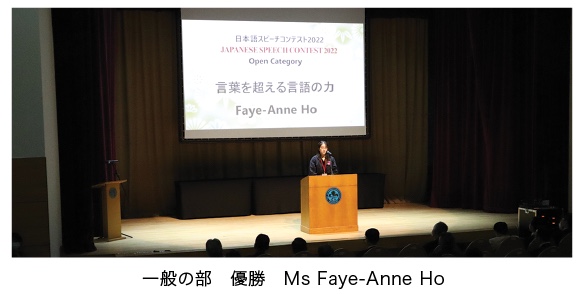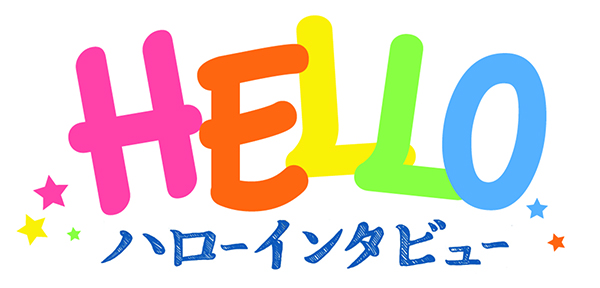Hello Interview Japanese Speech Contest 2022 Winner (Sep issue 2022)
01 Sep 2022
Japanese Speech Contest 2022 Winner
Ms Lee Hayoung(Secondary School category)
Ms Jolene Yee Xin Yi(Junior College category)
Ms Wu Nan(Tertiary category)
Ms Faye-Anne Ho(Open category)

Why did you decide to participate in the Japanese speech contest?
I started learning Japanese 4 years ago. Although I was confident in written test, I was self-doubtful about speaking Japanese. Then, my Japanese teacher, Mariko sensei informed me about the Japanese speech contest. I felt that it would be a great opportunity for me to convey my message in Japanese and improve my Japanese communication skill. Hence, I wanted to attend this speech contest.
How did you feel after the contest?
Speech contest was a great experience for me. It boosted my passion and drive to learn Japanese further. Now, I have more confidence to speak Japanese. Not only that, it also gave me many opportunities to meet many friends who are as passionate about Japanese like me. Although it was tough journey, I really enjoyed preparing and participating in this Japanese speech contest.
How did you become interested in Japan and the Japanese language?
I learnt English and Chinese in school. Since I was born and raised in Korea for 7 years, I also can speak Korean. Hence, I always wanted to learn Japanese to learn all East Asia languages. Not only that, learning Japanese also opens up to Japan's unique culture. I enjoyed watching Japanese animation which increased my interest to learn Japanese and Japan's culture.
What are some of the difficulties in studying Japanese?
It would be the tone for reading. The intonation of a word can change the meaning. Also, it reveals if the speaker is native Japanese or not. Hence, it was really hard to change the intonation to sound more natural and fluent.
What is the best thing about learning Japanese?
I can deeply understand the culture of Japan. In school, I had exchange programme with Singapore Japanses Secondary School under Japanese third language programme. I was able to converse with them in Japanese and undertand the cultural differences. It was interesting experience to interact with the students who speak the language I am learning.
What is your dream for the future?
I would like to work in MNC (multi-national cooperation) which works in the field of science and technology. I would like to work at a head office in a different country using the language I have learned, like Japanese, and work with people of other nationalities to make the project a success.
Please give us a final word.
Although it was tough journey, I am really glad that I had this opportunity to participate in this Japanesr speech contest. I would like to thank my Japanese teacher - Mariko sensei, Tutor - Ms Asako, my parents and friends who supported me through this journey. I really appreciate the sponsors, the organizers to make this speech contest successful.


Why did you decide to participate in the Japanese speech contest?
It is very rare that I have the opportunity to speak in front of a large crowd, let alone deliver a speech in my third language (Japanese). Hence, I certainly did not want to miss the chance to take part in the speech contest. It allowed me to improve my Japanese proficiency, hone my public speaking skills, and build confidence and courage.
How did you feel after the contest?
It has been a challenging but enjoyable journey. My growth and progress could not have been possible without the support and guidance of so many people. Special thanks to my family, my speech tutor (Hisanaga Sensei), my MOELC H2 Japanese teacher (Kawanishi Sensei), Secondary 4 teacher (Marcus Sensei), Secondary 1 teacher (Koh Sensei) and all others who have supported me all along. A big thank you to the sponsors and organisers of the contest too!
How did you become interested in Japan and the Japanese language?
Clichéd as it sounds, I, like many Japanese learners, have had a great interest in Japanese pop culture (Anime, in particular) since I was young. I have always viewed Japanese as a very elegant and sophisticated language, and Japanese culture too, has never failed to intrigue me with its beauty and intricacies.
What are some of the difficulties in studying Japanese?
I think learning how and when to use Keigo (Japanese Honorifics) is the toughest for me. Depending on the context and situation, distinguishing the use of each of the three levels of honorifics (casual, polite, honorific or humble) can be a very tricky task.
What is the best thing about learning Japanese?
Learning Japanese has enabled me to become more aware of global issues and current affairs by making a conscious effort to keep abreast of the latest happenings outside of Singapore (especially in Japan). I have also gained a deeper appreciation of the interconnectedness of various languages, despite how fundamentally different they are linguistically and culturally.
What is your dream for the future?
I hope to be able to pursue a career in the biomedical field, and contribute to society through what I do! On a lighter note, I really hope to be able to go on a tour around Japan sometime soon! (Japan has always been on my travel bucket list)
Please give us a final word.
To fellow foreign language learners out there, don’t be afraid of trying new things and making mistakes in the process! It is really alright – learning from mistakes is part and parcel of mastering a foreign language, and you gain valuable experience from it!
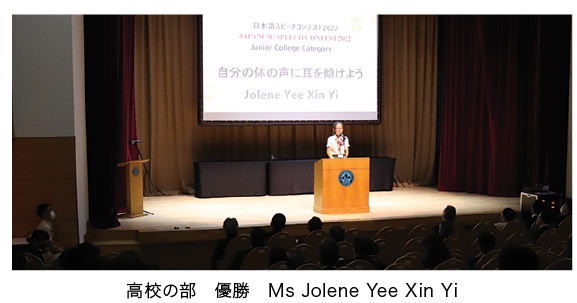
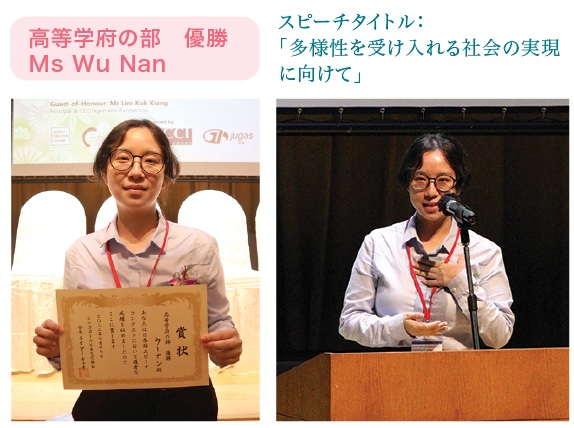
Why did you decide to participate in the Japanese speech contest?
To be honest, I have not even heard about the Japanese Speech Contest until last year. In June, Ms Chiba Satomi, who was the professor of two Japanese modules I have been enrolled in in NUS, invited and encouraged me to participate in the Japanese Speech Contest. Also, one of my seniors Faye-Anne Ho, who is the 1st prize winner of the open category this year, won the 1st prize of the tertiary category last year. This motivates me to join the Japanese Speech Contest as well.
How did you feel after the contest?
Since my speech was too long and I exceeded the time limit, I did not expect to receive any prize. Therefore, I was very surprised to receive the 1st prize. It was so much more tense when standing on the actual stage than normal practice, which caused me to forget the script sometimes, and it was really a relief when I finished the speech. As now I am during my internship, there was very limited time left for the preparation, I would like to express my appreciation towards Ms Chiba for her help in refinement and practice of the speech.
How did you become interested in Japan and the Japanese language?
I started studying Japanese when I was 13 years old, when I was a fan of a Korean idol group TOHOSHINKI, who were also popular in Japan. Although now I am no longer a fan of the idol group, I have become interested in Japanese culture and music, motivating me to keep myself familiarised with Japanese.
What are some of the difficulties in studying Japanese?
When I just started to study Japanese, I was struggling with Katakana. However, now I think that there are a lot of components harder than Katakana. For instance, it took me a long time to understand the meaning of rare and ancient Kanji when reading history fictions based on the Heian Period or Edo Period. Additionally, it is normal to have ambiguous expressions or sentences without subject in Japanese, it would not be easy to interpret the meaning of one sentence without reading it together with the context.
What is the best thing about learning Japanese?
The most significant benefit of studying Japanese is that I can now enjoy Japanese fiction and games. Despite that there are translated versions of these games or fiction, I prefer to read them in Japanese for the original atmosphere of the story. Apart from Fujiso Sensei by Lu Xun, I have also read other fiction like Takasebune by Mori Ogai and Run Melos by Dazai Osamu. Besides, I have also enjoyed several detective fiction books written by Higashino Keigo or Shimada Soji, as well as some famous detective games like Raging Loop and the Ace Attorney series.
What is your dream for the future?
To be honest, I have always been dreaming about becoming rich. To be more realistic, I would like to be employed as a normal software engineer and gradually accumulate my savings. And I hope my parents can keep healthy as well. This kind of quiet life is my dream.
Please give us a final word.
I really appreciate the organisers of the Japanese Speech Contest for providing a platform for Japanese-speakers to communicate with each other. I will sign up for next year’s contest (open category).
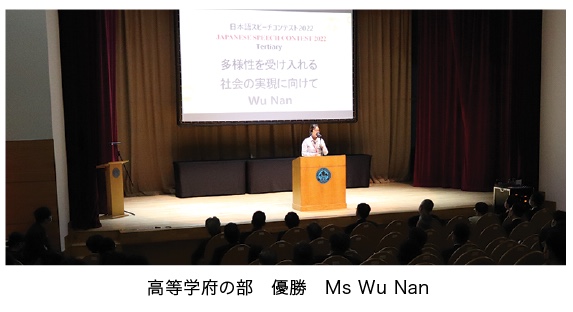
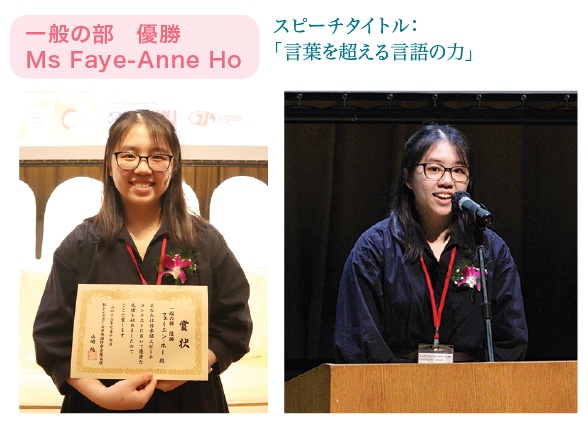
Why did you decide to participate in the Japanese speech contest?
I’ve actually participated in the Japanese Speech Contest twice previously under the Junior College and Tertiary Categories respectively. As both rounds were very challenging yet fun experiences for me, I decided to challenge myself one last time under the Open Category right after graduating from university and before getting busy with work.
How did you feel after the contest?
As an Open Category contestant this time, most of the contestants participating were either younger than me or spent less time studying Japanese. Nonetheless, I was deeply impressed by everyone’s expressiveness and pronunciation in Japanese, and enjoyed watching them speak passionately about various topics as an audience member myself. Additionally, as the previous round I had participated in was held without a live audience due to the COVID-19 restrictions, I felt very fortunate to be able to experience the liveliness of the auditorium and the live reaction of the audience during the speeches.
How did you become interested in Japan and the Japanese language?
Having lived in Japan with my parents for about 2 years soon after I was born, I have had many opportunities to come into contact directly with Japan and Japanese since young, and gradually grew a sense of closeness and affinity to the place and language. As my parents also love Japan and would often bring me there on holiday, I naturally became interested in learning the Japanese language.
What are some of the difficulties in studying Japanese?
It would be the ambiguous expressions and keigo (honourifics) unique to Japanese language, as mentioned in my speech. Even if the correct meaning and use of the expression can be understood theoretically, it is not as simple as following a certain format once it comes down to actually using these expressions in a Japanese conversation. In fact, I realised that this was a whole new challenge that involved having to consider various factors such as the situation at the time and the relationship between the speakers.
What is the best thing about learning Japanese?
My world has expanded in many ways. The ability to use and understand Japanese has allowed me to further deepen my interest in Japan and Japanese culture, recognise various ways of thinking and living, and become a skill that has expanded my potential in terms of the work I can do and areas where I can be useful. Above all, learning Japanese has allowed me to form many lasting connections - from the teachers and friends I made through Japanese language classes, to the Japanese people I met through various exchange opportunities - that I still cherish today.
What is your dream for the future?
I hope to be able to draw on the language proficiencies I have honed so far to contribute in areas dealing with international relations one day.
Please give us a final word.
I would not have been able to participate in the Japanese Speech Contest thrice and achieve these results without the help of all the teachers who taught me Japanese and my family who supported my learning of Japanese, as well as the Japanese Association of Singapore and all the parties involved in the organisation of the Japanese Speech Contest. I hope to respond to everyone’s support by continuing to make good use of my Japanese proficiency going forward.
